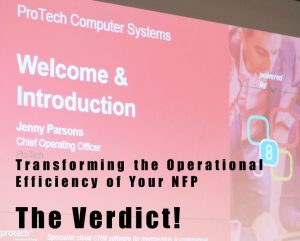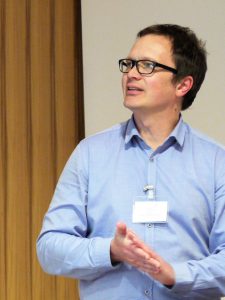Association News
Transforming the Operational Efficiency of Your NFP…the Verdict!
April 23, 2017 - Association News

Transforming the Operational Efficiency of Your NFP…the Verdict!
So, you run a membership organisation, and you’ve got that despondent feeling that your group is underperforming. Nothing concrete, but you’ve got that sinking sensation in the pit of your stomach that you’re not on top of your game. Maybe you could be slicker. Perhaps it’s time for a new membership category or a new service to get you back in the game. Or even time to bring your tech systems up to date: even cut overheads by switching some of your time-consuming member admin burden to self-service!
Start with the CRM system, then think through your membership categories? Who knows, you might even interest members in a certified training scheme, or at least ginger up your current offering with some virtual reality? But all that costs money. And, even if you could convince the Board, where would you begin? Better do some research or, better still, give someone else the task of investigating the market? At least that way you can say you’re making progress!
Well, if you were really lucky, shortly after having those nagging doubts, you would have found yourself sitting-in on ProTech’s recent seminar entitled ‘Improving Your NFP’. Not just because it brought together a group of like-minded individuals, but because among its speakers were experts in CRM systems; providers of assessment, certification, and workforce learning; pioneers in learning technologies; and workers at the coal-face of data and business strategy.
 Introducing the session, Jenny Parsons, ProTech’s Chief Operating Officer, was quick to point out that most of your frustrations probably stem from working with disparate systems inherited – or procured – over time, and without strategic direction. Or processes that have evolved in different directions across different regions. Or frustrated attempts to standardise processes within the confines of available technology. Of course, the Holy Grail is a fully integrated system, but where to start?
Introducing the session, Jenny Parsons, ProTech’s Chief Operating Officer, was quick to point out that most of your frustrations probably stem from working with disparate systems inherited – or procured – over time, and without strategic direction. Or processes that have evolved in different directions across different regions. Or frustrated attempts to standardise processes within the confines of available technology. Of course, the Holy Grail is a fully integrated system, but where to start?

Allen Reid, Director of Client Projects, Hart Square
A show of hands revealed that a fair proportion of Allen Reid’s audience were ‘investigating’ the market on behalf of their organisations – probably not for the first time – and if events followed their normal course some of their businesses would end up with a ‘feature-dump’ of requirements leading to some sales demos, a rush to contract (and budgets), and a massive specification document to cover all eventualities. Unsurprisingly some would result in costly failure.
Thirty-one percent of projects fail because of poor definition of business requirements, poor process designs, and recreation of inefficient processes in the new system. Twenty-four percent are down to people, lack of user adoption, poor execution skills, and lack of time or focus on implementation. Twenty-nine percent lack a strategy with clear and detailed goals and objectives. Of the remaining portion, failures come from a range of issues, including poor of missing functionality, or the burden of unwarranted customisation.
Hart Square are an independent consultancy that work with over 50 CRM and web suppliers. Their role is help NFPs choose a CRM supplier by asking key questions, and in so doing to unblock the pipeline to success.
In Reid’s estimation, a CRM project actually starts before the first client meetings by understanding the business’ strategy, with a business process review, the gathering of requirements, and the drawing of a road map. Next come the introduction of a business case, the drawing up of a realistic detailed budget, and a project plan. The business case will lead to buy in – from staff, officers, and the Board – and give clarity to the ultimate objectives; transparency over what the project will cost in time and money; and a clear and unified call to action.
But it is also your responsibility to get to know your supplier. This isn’t speed dating, and it is your responsibility to really study them. Find out how big, well resourced, and experienced they are. Have they undertaken this kind of project before, or will they be learning on the job – and at your expense! Software preferences and prejudices are a distraction, but does their culture fit with yours? And as time is the biggest part or every project, don’t undervalue it, and recognise that you’re in it for the long haul.

John Fecci
It is easy to misunderstand augmented and virtual reality and tempting to view it as just the latest techno fad, or dismiss it as simply the preserve of gamers. But you’d be wrong! And, as John Fecci, commercial director for eLearning studios demonstrated, the three related fields of augmented reality, 360 video, and virtual reality, are emotive tools that embed learning far more effectively than online box ticking. Each has its advantages and appropriate application, but they are distinct learning approaches delivered through a headset.
Augmented reality can be used to overlay details on actuality, and can be used on-the-job by, for example, service engineers attempting to diagnose faults in technical systems. Unlike 360 video which allows trainees to see – but not interact with – the task they have to perform in a realistic environment, or virtual reality where every aspect of a situation has been pre-programmed and the software helps the trainee to learn a job by giving haptic responses to their actions. In each case, immersion, emotion, and experience are the outcomes!
Experience so far shows that all three have particular relevance in situations where real-life training would be either dangerous – such as firefighting; or too expensive to keep practicing on the real thing; or where health and safety procedures or scenarios like evacuation must be practiced for use in an emergency.
How long the positive effects of learning this way will last once it becomes commonplace is unclear, but Fecci’s view is pragmatic. Virtual reality is not going to overturn other forms of learning, it just does some things better – like the microwave oven – it won’t ever replace the cooker!
 Chloe Mendonça
Chloe Mendonça
Chloe Mendonça, UK Marketing Manager, Questionmark, describes the technologies and services that enable organisations to measure knowledge, skills, and attitudes securely and achieve successful learning outcomes. Solutions enable reliable, valid and defensible assessments by providing learning and testing professionals with collaborative authoring tools, accommodating participant needs with blended and multilingual delivery and informing stakeholders through timely reporting and meaningful analytics.
 Steve Shiels
Steve Shiels
Steve Shiels, Professional Services Manager at ProTech, gets to grips with the wealth of data generated by trade association learners, and suggests ways in which this can harnessed across multiple processes, to improve learner engagement and operational efficiency.
 Ian Roach
Ian Roach
Ian Roach, ProTech Senior Business Consultant, provides a comprehensive analysis of the perfect membership scheme as based on analysis by MemberWise. Their practical guide on Membership Scheme Management and Development is invaluable for any NFP executive setting out to devise a new membership strategy, or revise their current one.
How was it for you?
Personally, I found it a useful and informative day that reflected my own past experience of searching for trade association tech solutions and, as always, tend to wish I’d had the benefit of this knowledge then. But that’s the beauty of hindsight! What is more important is the reaction of the ‘man or woman in the street’. This is what Charlotte Kenny, Quality Officer, University of the Arts London, had to say:
“I was asked to stand in for another member of staff on this occasion so I didn’t have any expectations whatsoever regarding the event apart from the fact that I thought there would be more people in attendance but I thought it was very professionally run and made me inclined to find out more about ProTech, an organisation that incidentally I’d never heard of before. I suppose I found the talk on learning within a Virtual Reality environment the most interesting but not sure how that would work within an arts environment but that may be due to my limited imagination.
Possibly the most relevant talk of the day was the first one by Allen Reid from Hart Square. I found that the most informative and I thought he was a very good speaker. The content of his talk is something that I will definitely discuss with colleagues here and hopefully that will inform any work that we do in this area.”
Michael Hoare
©2017 M J Hoare


